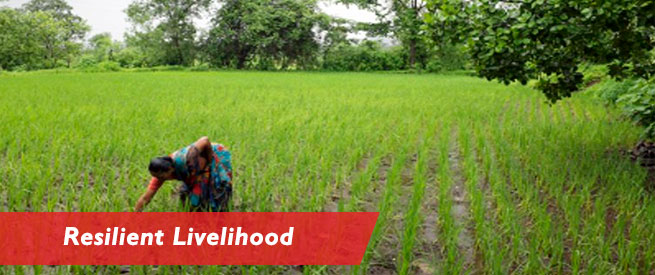
INTRODUCTION
The majority of the rural poor rely heavily on their local environments to provide basic necessities like water, food and energy. These vital resources provide the backbone of many rural livelihoods and their stability is key to securing the wellbeing of their entire communities
Disasters and food insecurity are directly interconnected. They interrupt market access, trade and food supply, reduce income, deplete savings and erode livelihoods. Drought, plant pests and diseases, animal diseases and food contamination have a direct economic impact by reducing farm production, by adversely affecting prices, trade, and market access and by decreasing farm income and employment. Economic crises such as soaring food prices reduce real income, force the poor to sell their assets, decrease food consumption, and reduce their dietary diversity and access to safe and quality food. Disasters create poverty traps that increase the prevalence of food insecurity and malnutrition.
Disaster risk reduction is about protecting people’s livelihoods from shocks, and strengthening their capacity to absorb the impact of, and recover from, disruptive events. It is a necessary ingredient for food and nutrition security. Furthermore it also creates a multiplier effect that accelerates the achievement of the Millennium Development Goal 1: the eradication of extreme poverty and hunger.
DURATION
5 days
WHO SHOULD ATTEND?
This course is intended for various actors in the Agriculture Extension (Agricultural extension officers, senior agricultural officials and policy makers) working with communities, in governments, funding agencies, Research organizations and non-government organizations among others for Agriculture support activities and other Development programmes.
LEARNING OBJECTIVES
By the end of the course, learners will be able to:
• Understand various terms in food security and risk reduction
• Improve access to adequate sanitation and knowledge and practices of health and hygiene
• Improve household food production, consumption and dietary diversity
• Improve agricultural infrastructure and agricultural practices
• Improve home-based livelihood opportunities for the rural poor through marketing training and by supporting the establishment and capacity-building
• Develop and strengthen community-based livelihoods management and disaster preparedness and response mechanisms
How to participate
Tailor Make A Course
Register Individual
Register Group
Become One of Our Partners.
View Agriculture, Food Security and Rural Livelihoods Development Institute Course Catalogue
For further inquiries, please contact us on Tel: +254 715 077 817, +254 (020) 211 3814, +254 731240802, +254 735331020.